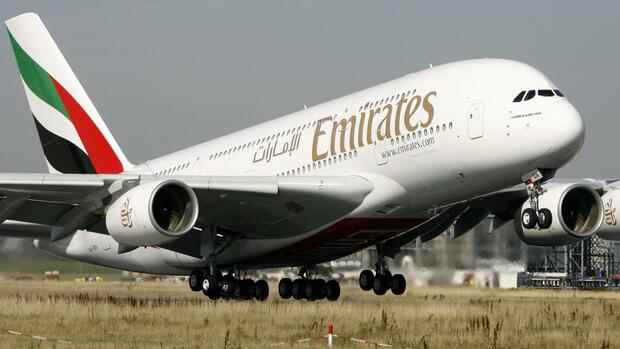Hamburg, Dubai The A380 chapter is over for the aircraft manufacturer Airbus – only 16 years after the first flight. The Arab airline Emirates wanted to receive the very last machine of the world’s largest passenger jet on Thursday at the factory in the Hamburg district of Finkenwerder. On the same day, the aircraft with the serial number MSN272 was to take off for the transfer flight, then with the official Emirates identification number A6-EVS. Unlike the start, which was noticed worldwide, it was supposed to be a quiet celebration: Due to the ongoing corona pandemic, no guests were allowed.
The European aircraft manufacturer once wanted to revolutionize aviation with the gigantic aircraft, which overshadows the legendary Boeing Jumbo 747 in terms of size and capacity. The developers’ idea was to be able to transport as many passengers as possible with as few aircraft as possible on race tracks between large air traffic hubs.
“The increasing compression of the airspace and the lack of space at the airports call for larger aircraft,” said designer Jürgen Thomas, who is known as the “father of the A380”. Great opportunities were expected, especially in Asia. Long-time Airbus sales manager John Leahy continued to support this line of argument even after he had not received any new A380 orders for years.
In the meantime, customer requirements have changed – airlines tend to prefer smaller twin-jet planes for as many direct flights as possible, even between smaller airports around the world. Because giant planes like the Boeing 747 or the A380 consume a lot of fuel with their four engines – that is not economical, especially if the jets are not fully occupied. In addition, there are higher maintenance costs. That’s why Boeing has already announced the end of the 747 era.
Top jobs of the day
Find the best jobs now and
be notified by email.
Although Airbus did break even in ongoing production in the middle of the last decade, the bottom line is that it probably didn’t earn a euro with the aircraft, if you add billions in development costs. After several cancellations, the former Airbus boss Tom Enders had to pull the rip cord in 2019 and prematurely announced the end of the A380 program.
“Back then there were completely exaggerated market forecasts”
Public funds – mainly from France, Germany and Spain – flowed into the development of the aircraft. Airbus now promised that the A380 project was not over – after all, they wanted to continue to support the existing fleet. For example, the manufacturer says it is continuing to work on improving the competitiveness of the aircraft, for example in terms of maintenance costs, as board member Philippe Mhun says.
The double-decker passenger jet had been causing Airbus great concern for a long time. Hardly any airline had ordered the model. How many A380s they wanted to sell was never officially stated. “Back then there were completely exaggerated market forecasts,” says aviation expert Andreas Spaeth. He assumes that Airbus would only have made money with the A380 “beyond the 500”. With the last Emirates A380, there were only 251 machines delivered in the end.
Airbus does not like to see the excursion into the world of giant aviators as an expensive wrong decision. Mhun, program manager of the group, called the aircraft a “cornerstone” in the development of the multinational company from a joint venture of several companies “to a truly integrated company” – in technical, industrial and cultural terms.
In addition, many of the A380 innovations later benefited the twin-engine A350, says Mhun: “Without the 380, Airbus wouldn’t be Airbus today, without the 380, the 350 wouldn’t be the 350 today, and that’s something that is really important.”
Emirates was the main customer for the A380
In addition, the giant plane was always a prestige project in the fight against the big US rival Boeing, which at that time had occupied the sky of the four-engine wide-body aircraft with the jumbo alone. “The Airbus A3XX will never fly. There is no market for this aircraft, the Europeans cannot manage it, ”Boeing once predicted. With this in mind, Airbus board member Mhun says today: “I think it was worth it. Remember, we were a challenger to Boeing. It was the right decision.”
Emirates has accepted a total of 123 copies of the aircraft from Airbus, almost half of all 251 A380s ever sold. However, the airline has already retired five. Emirates boss Tim Clark has assured that the company will be the largest operator of the double-decker aircraft “also in the next two decades”.
Lufthansa, on the other hand, with 14 copies also one of the larger among the only 14 A380 customers, has officially closed the chapter. That is no longer an issue, said Lufthansa boss Carsten Spohr. The machines are mothballed in Teruel, Spain, six of which Airbus has already taken back at an undisclosed price. “That is completely normal and happens with every program,” says Airbus manager Mhun. He hopes that buyers will be found for the used aircraft as soon as the aviation industry recovers from the unprecedented Corona crisis with slumps, especially on the long routes.
More: Qantas to switch domestic fleet from Boeing to Airbus
